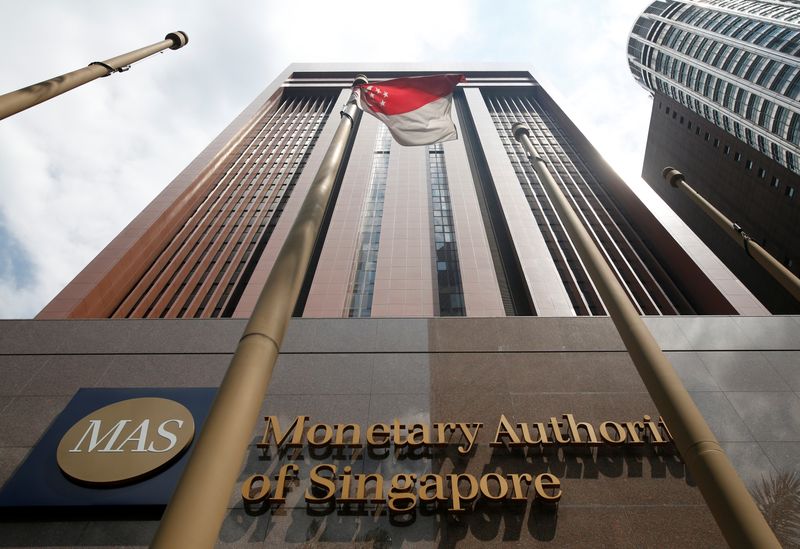By Xinghui Kok
SINGAPORE (Reuters) -Singapore's central bank left its monetary policy unchanged on Friday, in line with expectations, as authorities looked for signs inflation in the city-state was moderating before they consider loosening settings.
The Monetary Authority of Singapore (MAS) said it will maintain the prevailing rate of appreciation of its exchange rate-based policy band known as the Nominal Effective Exchange Rate, or S$NEER.
The width and the level at which the band is centred did not change.
MAS said in a statement that current monetary policy settings remain appropriate.
"The prevailing rate of appreciation of the policy band is needed to keep a restraining effect on imported inflation as well as domestic cost pressures, and is sufficient to ensure medium-term price stability."
While central banks globally are broadly seen having completed their aggressive policy tightening, there is less certainty about when they will start easing monetary settings and by how much.
OCBC economist Selena Ling said central banks may be hesitant to loosen monetary policy with recent inflation prints buoyant and crude oil prices ticking up.
"It is too premature to pull the trigger on easing when the view that core CPI will step down in 4Q24 into 2025 remains intact," said Ling of Singapore.
Also on Friday, South Korea's central bank left interest rates at a 15-year high as stubborn inflation and strong export growth gave policymakers reasons to hold off easing policy.
Gross domestic product (GDP) in Singapore rose 2.7% year-on-year in the first quarter of this year, according to advance estimates published by the trade ministry on Friday. A Reuters poll had estimated first quarter GDP growth at 2.9%.
The MAS said it expects the economy to strengthen over 2024 and for inflation to "stay on its broadly moderating path and step down in Q4, before falling further into 2025".
The trade ministry projects growth of 1% to 3% in 2024.
Meanwhile, core inflation remains sticky after tapering from its peak of 5.5% in January and February last year. Inflation cooled to 3.1% in January then rose to a 7-month high of 3.6% in February as seasonal effects from the Lunar New Year drove services and food prices higher.
"The economy is cruising once again, while core inflation remains sticky," Maybank economist Chua Hak Bin said. "We see low odds of a move at the next MAS meeting in July. We expect the MAS to ease only in October, at the earliest."
As a heavily trade-reliant economy, Singapore uses a unique method of managing monetary policy, tweaking the exchange rate of its dollar against a basket of currencies instead of domestic interest rates like most other countries.
MAS has tightened monetary policy five times since October 2021, including in two off-cycle moves, to tame inflation during the pandemic and amid global geopolitical instability.
But in April, October and January, it held its stance when concerns over economic growth trumped inflation.
This is the second policy review since the central bank shifted to a quarterly schedule from its previous semi-annual routine.
The Singapore dollar was a tad weaker at 1.3530 per U.S. dollar after MAS left monetary policy settings unchanged.
